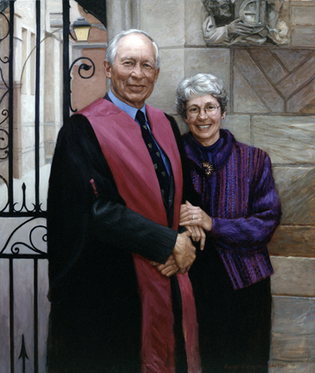
Robert Alexander Anderson
A portrait of Bernard Lytton and his wife Norma Lytton, painted by Robert Alexander Anderson, hangs in Jonathan Edwards College.
View full image
Dr. Bernard Lytton, Donald Guthrie Professor of Surgery, Emeritus, died in England on October 24, at age 96. Aside from his major accomplishments in medicine, Lytton faithfully served the university in various roles, including a decade as master of Jonathan Edwards College (1987–1997). He also served on this magazine’s board of directors from 1994 to 1999. Mark Ryan ’74PhD, JE’s dean in those years, offers this remembrance.
Extraordinarily “decent.” That is how I recall my decanal colleague in Branford College describing Bernard Lytton in 1987, when Lytton was appointed master of Jonathan Edwards after a semester as acting master of Branford.
By that time, British-born Berny had been at Yale since 1962, a distinguished member of the Department of Urology at the medical school. His accomplishments in medicine were legendary: he had pioneered in kidney transplantation and bladder replacement, and he had adopted and refined surgical advancements and radiological treatments for such ills as kidney stones and prostate cancer. He was instrumental in opening the first dialysis unit in Connecticut and the first hospice in the United States. After the mastership, he became first director of the Henry Koerner Center for Emeritus Faculty. Berny’s list of contributions to the Yale community, for sure, could be extended well further.
My window into his character and wisdom, however, came through his mastership. To that role he brought extraordinary energy and dedication, his dignified but often playful style, the authority of his presence, and his personal warmth and empathy. With his wife Norma, who died in 2007, Berny presided over college events with polish and flair, carrying an air of natural dignity and bonhomie that gave them weight and verve. Behind that presence was an authority that, no matter the situation, inspired trust. If a difficult conundrum arose in the college, Berny would face it head-on, hearing out all perspectives and readily forming a clear sense of what to do about it. His stature in the community was so strong, his integrity so evident, and his dealings with those affected so direct and personal, that when he acted, no one thought to question the matter.
For all his capacity as a decision maker, Berny’s wisdom showed as well in knowing when not to decide—when to let students grapple with matters for themselves. He was always watchful, always ready with guidance when it was called for, but his primary concern was that students, through their own initiative, solidify further their sense of community responsibility. Beyond that, Berny and Norma plunged into the life of the college, participating with spirit and gusto in social events and spending untold hours visiting with students in the dining hall, learning about their lives, interests, thoughts, and struggles.
As a consequence of all those virtues, JE students in 13 successive classes knew that the Lyttons genuinely cared about them. Nothing, surely, is more critical to successful college leadership than that basic trait, and Berny and Norma embodied it for ten full years. That, no doubt, is what my colleague in Branford meant, all those years ago, in describing Berny Lytton as so very “decent.”
 loading
loading